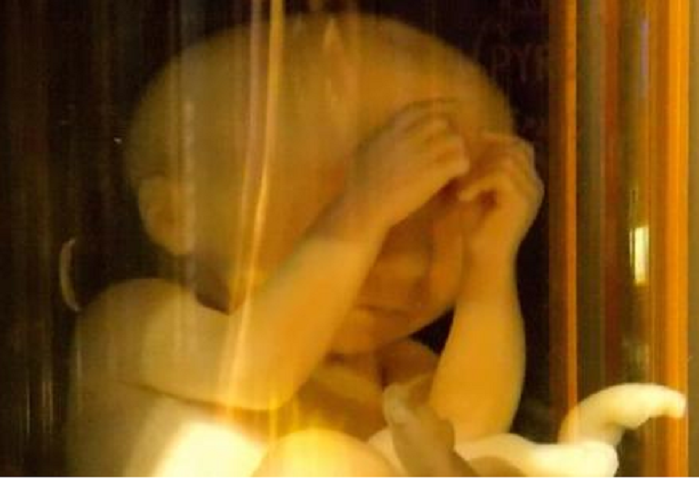One of the most prestigious medical journals in the United States is refusing to retract publication of a study that falsely claims unborn children don’t feel pain.
The Journal of the American Medical Association is facing calls to retract a 2005 study that pro-lifers have labeled a “propaganda tool” for abortion activists.
The research study, published in JAMA in 2005, claimed to show that unborn babies likely do not feel pain before 29 weeks gestation. It is commonly cited by abortion activists today to attack bills that ban abortions after 20 weeks, despite strong scientific evidence showing that unborn babies can feel pain at 20 weeks if not earlier.
Just Facts President James Agresti refuted the research in detail here.
According to his fact checking report, several of the study’s authors have close ties to the abortion industry, one having worked for the radical pro-abortion group NARAL and another who worked in an abortion facility. Both the New York Times (“Study Authors Didn’t Report Abortion Ties”) and USA Today reported ethical issues with the study in 2005, according to the report.
“[T]he vast weight of scientific evidence indicates that preborn humans can feel pain by 20 weeks or earlier. While this does not rise to the level of 100% certainty, it rests upon factually solid ground,” Agresti wrote at the time.
In addition, Agresti told the National Catholic Register newspaper that “the JAMA paper’s central argument was conclusively refuted by peer-reviewed medical journals less than two years after it was published.”
Click here to sign up for pro-life news alerts from LifeNews.com
But, JAMA has declined the call for a retraction of its flawed study. JAMA’s editor-in-chief said in a letter that it was not problematic for three of the study’s five authors to not disclose their ties to the abortion industry.
The letter says: “…[T]he information that we have indicates the authors complied with the journal conflict of interest requirements in 2005.”
The JAMA letter goes on to say that the qualifiers to the study protected it from claims of inaccuracy, and that both of the studies cited by Agresti that reflected fetal pain at 20 weeks’ gestation did not fully prove that the pain existed. But that is based on the definition of fetal pain used by the pro-abortion authors of the faulty study.
Later, Agresti told Christian Broadcast Network that the two more recent studies show that the JAMA study’s main conclusion, that a developed cerebral cortex is necessary to feel pain, is false.
Despite abortion activists’ attempts to disprove unborn pain, a dozen states have passed the Pain-Capable Unborn Child Protection Act to protect unborn babies from painful abortions after 20 weeks. They are Alabama, Arkansas, Georgia, Idaho, Kansas, Louisiana, Nebraska, North Dakota, Oklahoma, Texas, West Virginia and Wisconsin. Legislation to ban these late-term abortions also has been introduced in a number of other states.
Kristan Hawkins, president of Students for Life, echoed the calls to retract the study.
“It has been used as a propaganda tool pushed by the abortion industry to continue to line their pockets and betray the women they claim to want to help and protect,” Hawkins said. “Having this study in the public eye without acknowledging the people behind it, those who profit greatly from abortion,” would lead to more harm for women and children, she told the newspaper.
David Prentice, a well-known researcher and vice president of the Charlotte Lozier Institute, also called the paper “scientifically inaccurate” and “ethically unsound.” The Charlotte Lozier Institute has been a leading voice in the research showing that unborn babies do feel pain by 20 weeks if not earlier.
Dr. Steven Zielinski, an internal medicine physician from Oregon, is one of the leading researchers into fetal pain. He first published reports in the 1980s to validate research showing evidence for unborn pain.
He has testified before Congress in the past that an unborn child could feel pain at “eight-and-a-half weeks and possibly earlier” and that a baby before birth “under the right circumstances, is capable of crying.” Researchers also have found that unborn babies respond to touch as early as six weeks.
He and his colleagues Dr. Vincent J. Collins and Thomas J. Marzen wrote, “The functioning neurological structures necessary to suffer pain are developed early in a child’s development in the womb.”
“Functioning neurological structures necessary for pain sensation are in place as early as 8 weeks, but certainly by 13 1/2 weeks of gestation. Sensory nerves, including nociceptors, reach the skin of the fetus before the 9th week of gestation. The first detectable brain activity occurs in the thalamus between the 8th and 10th weeks. The movement of electrical impulses through the neural fibers and spinal column takes place between 8 and 9 weeks gestation. By 13 1/2 weeks, the entire sensory nervous system functions as a whole in all parts of the body,” they continued.
Further research showed that hormone levels in unborn babies decrease when pain-relievers are supplied, LifeNews previously reported.
This January, an extensively researched document on the science of fetal pain was published by the Family Research Council (FRC). The report cites more than 30 scientific studies, testimonies, medical evidence, and real-life experiences in its exposition of the science of fetal pain as the weeks advance post-fertilization.
Agresti told the Register that pro-lifers should not “jump to conclusions about JAMA’s commitment to integrity and accuracy” and give the editors a chance to review the concerns he presented.








